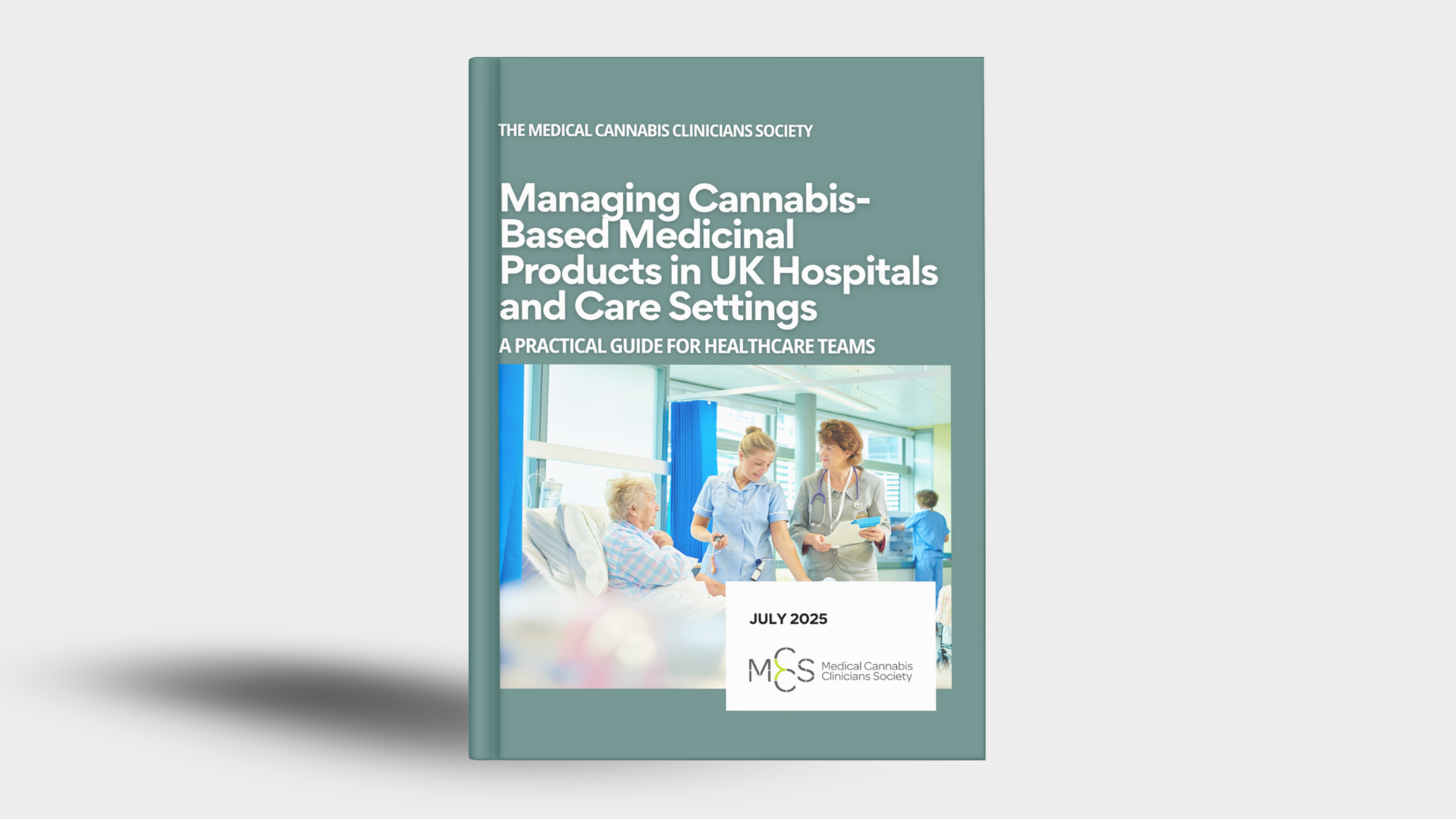Managing Medical Cannabis Prescriptions During Admission: A Practical Guide for UK Clinicians
July 21, 2025 | IN INFORMATION | BY Kate Thorpe
With increasing numbers of patients using legally prescribed cannabis-based medicinal products (CBPMs), clinicians in the NHS, hospices, care homes and private hospitals are facing a practical challenge: how to safely, lawfully, and confidently manage these medicines during admission, surgery, and inpatient care.
The Medical Cannabis Clinicians Society has published a new guide – Managing Cannabis-Based Medicinal Products in UK Hospitals and Care Settings – written for doctors, nurses, pharmacists, anaesthetists, surgeons and care providers across secondary and palliative care.
This post offers a summary of the key points and provides an overview of what clinicians need to know, from legal responsibilities to patient rights and perioperative management. It’s designed to support anyone searching for CBPM hospital policy, medical cannabis prescriptions during hospital or hospice admissions, or simply how to stay compliant when managing medical cannabis in hospital settings.
For full details, practical checklists, and best practice examples, download the guide.
What is a CBPM?
Cannabis-based medicinal products (CBPMs) are medicines derived from cannabis that are prescribed for specific medical conditions. In the UK, they are legal only under very specific conditions. CBPMs are:
- Schedule 2 controlled drugs under the Misuse of Drugs Regulations 2001
- Prescribed by specialist doctors registered with the GMC
- Often used where licensed medicines have failed or are unsuitable
- Available in forms including oils, capsules, oral sprays, and vapourised flower
Understanding what qualifies as a CBPM is essential for any clinician looking to implement a safe and lawful CBPM hospital policy.
Legal Rights of Patients Using CBPMs in Hospital
According to the Mental Capacity Act 2005, patients with capacity have the right to make decisions about their treatment, including continuing prescribed CBPMs while in hospital.
Clinicians must not withdraw or alter CBPM treatment without informed consent, and must support continuity of care unless safety concerns are present.
The Equality Act 2010 also applies: refusing a patient access to their legal medication could be considered discriminatory if it disadvantages them due to disability. Whether you’re drafting protocols or providing direct care, it’s crucial to know how to manage CBPMs in hospital in line with these legal duties.
Key Actions for Clinicians
The MCCS guide outlines a clear process for managing medical cannabis in hospital. Clinicians should:
Ask Directly on Admission
“Are you currently taking any cannabis-based products prescribed for medical use?”
Patients may use CBPMs such as oils, sprays or vapourisers for conditions including chronic pain, epilepsy, spasticity, anxiety or palliative symptoms.
Verify Legality and Documentation
- Request to see the prescription or clinic letter
- Confirm the product was prescribed by an authorised clinician
- Check the formulation, dosage, and frequency
- Ensure the medicine is not recreational or illegally sourced
Record Clearly and Notify the Team
- Document the CBPM in the patient’s drug chart and notes
- Notify the pharmacy, anaesthetic team, and relevant consultants
- Highlight any possible interactions with anaesthetic or other medications
These steps are essential to align with hospital governance, CD handling rules, and best practice CBPM hospital policy.
Managing Patient-Owned CBPMs on the Ward
Because CBPMs are Schedule 2 controlled drugs, they must be handled with the same procedures as other CDs.
Key points include:
- Secure storage in the CD cabinet unless a self-administration plan is in place
- Respect for patients’ rights to self-administer where safe and appropriate
- Providing access to a safe, private area for administration (vaping in outdoor spaces or single rooms where policy permits)
Hospitals should not force patients into unsafe environments (e.g., smoking shelters) to take their prescribed treatment. These are all vital considerations for hospitals updating or implementing a formal medical cannabis prescription hospital framework.
Clinical Considerations: Perioperative, Safety and Interactions
The MCCS guide includes detailed clinical considerations around CBPM surgery guidance, such as:
- What to ask during the pre-op assessment
- Drug interaction risks (especially with CYP450-metabolised medications)
- How THC may affect anaesthesia depth, cardiovascular stability, and airway reactivity
- Whether and when to pause CBPMs before surgery
- How to safely resume CBPMs post-op with input from the prescribing specialist
If you’re involved in perioperative care or writing hospital protocols for anaesthesia and sedation, understanding how to manage CBPMs in hospital is a clinical safety issue, not just a legal one.
Download the guide
There’s much more in the full document.
🔽 Download the guide now:
Managing Cannabis-Based Medicinal Products in UK Hospitals and Care Settings
Whether you’re building a CBPM hospital policy, managing admissions, working directly with a patient with a cannabis prescription, or supporting a patient through surgery, this guide is your go-to reference.
Looking for more support?
The Medical Cannabis Clinicians Society is the UK’s leading independent network for healthcare professionals supporting the use of cannabis-based medicinal products and prescriptions.
Join today and get:
- 24/7 support from peers and the MCCS expert committee
- Access to our active Google Group for real-time clinical advice
- CPD-accredited training, events, and webinars
- Evidence-based resources and guidance tailored to UK practice
Annual membership starts at £60.
Together, we’re raising standards and supporting clinicians to deliver safe, lawful and effective care for patients using medical cannabis in UK hospitals.
Frequently Asked Questions
Can patients bring medical cannabis into hospital?
Yes, if prescribed. Patients should bring their CBPM in the original packaging with prescription details.
Can hospital staff administer or manage these medicines?
Yes, as with any other controlled drug, under appropriate documentation and procedures.
Where should CBPMs be stored?
In the controlled drugs cabinet, unless the patient has an approved self-administration plan.
Can patients vape cannabis in hospital?
If prescribed and appropriate, patients may use vapourised CBPMs, but not smoke cannabis, in a private or designated space per local policy.
Can I alter the patient’s treatment plan?
No, not without informed consent. Patients with capacity have the right to continue their prescribed CBPMs, and this must be respected.
